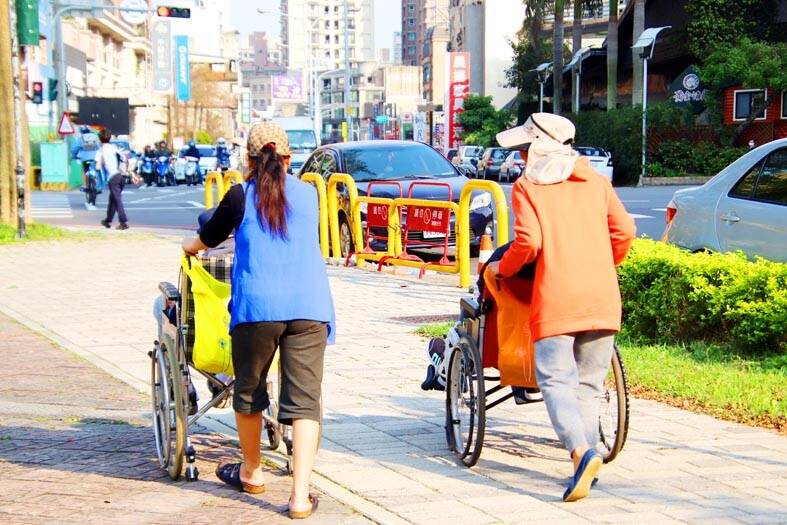The Executive Yuan yesterday approved the long-term care 3.0 program’s implementation starting next year, which is to feature reduced waiting time for outpatients to receive care and expanded geographical coverage of facilities.
Premier Cho Jung-tai (卓榮泰) approved the Ministry of Health and Welfare plan and instructed it to prepare for its rollout by working closely with the private sector, Cabinet spokesperson Michelle Lee (李慧芝) told a post-Cabinet meeting news conference in Taipei.
Deputy Minister of Health and Welfare Lue Jen-der (呂建德) during the meeting reported on the program’s achievements and unveiled its targets, an Executive Yuan statement said.

Photo: Huang Mei-chu, Taipei Times
Long-term care 2.0, the current iteration of the program, owed its success to collaboration between the public and private sectors, Lue said.
Since 2016, the number of program recipients has increased 8.4 times to 756,000, its workforce increased fourfold to 100,000 and funding increased 18.7 times to NT$92.6 billion (US$2.81 billion), he said.
Long-term care facilities increased 20.9 times to 15,000 and the average waiting period for out-of-hospital patients for receiving care decreased 13 times to four days during the same period, he added.
Nearly 90 percent of program recipients were satisfied with the services provided, the statement cited Lue as saying.
The new version of the program is to focus on building a long-term care facility within 10 minutes’ drive of every household while improving the quality of care, he said.
The program would divide Taiwan into administrative regions, he added.
It would decrease the average waiting time for outpatients to obtain the services of carers, an area in which the ministry has already made strides, Lue was cited as saying.
The target is to reduce waiting times to minus-one day, meaning long-term care arrangements would be made the day before a patient leaves hospital, he said.
The program would integrate hospitals and long-term care to boost the quality of care for moderately or severely impaired people, Lue said.
The number of recipients would be increased from people aged 65 and older, indigenous people aged 55 and older, and people with disabilities to younger age groups, he said.
Medical data showed the average age of stroke victims is declining in Taiwan, he added.
The centerpiece of the new program is making improvements to community-based care as envisioned in the current program, ministry officials were cited as saying.
The program would additionally pre-emptively promote health, strengthening family-based care solutions, making better use of algorithms, implementing end-of-life care, and facilitating career education and training, they said.

The manufacture of the remaining 28 M1A2T Abrams tanks Taiwan purchased from the US has recently been completed, and they are expected to be delivered within the next one to two months, a source said yesterday. The Ministry of National Defense is arranging cargo ships to transport the tanks to Taiwan as soon as possible, said the source, who is familiar with the matter. The estimated arrival time ranges from late this month to early next month, the source said. The 28 Abrams tanks make up the third and final batch of a total of 108 tanks, valued at about NT$40.5 billion

Two Taiwanese prosecutors were questioned by Chinese security personnel at their hotel during a trip to China’s Henan Province this month, the Mainland Affairs Council (MAC) said yesterday. The officers had personal information on the prosecutors, including “when they were assigned to their posts, their work locations and job titles,” MAC Deputy Minister and spokesman Liang Wen-chieh (梁文傑) said. On top of asking about their agencies and positions, the officers also questioned the prosecutors about the Cross-Strait Joint Crime-Fighting and Judicial Mutual Assistance Agreement, a pact that serves as the framework for Taiwan-China cooperation on combating crime and providing judicial assistance, Liang

A group from the Taiwanese Designers in Australia association yesterday represented Taiwan at the Midsumma Pride March in Melbourne. The march, held in the St. Kilda suburb, is the city’s largest LGBTQIA+ parade and the flagship event of the annual Midsumma Festival. It attracted more than 45,000 spectators who supported the 400 groups and 10,000 marchers that participated this year, the association said. Taiwanese Designers said they organized a team to march for Taiwan this year, joining politicians, government agencies, professionals and community organizations in showing support for LGBTQIA+ people and diverse communities. As the first country in Asia to legalize same-sex

MOTIVES QUESTIONED The PLA considers Xi’s policies toward Taiwan to be driven by personal considerations rather than military assessment, the Epoch Times reports Chinese President Xi Jinping’s (習近平) latest purge of the Chinese People’s Liberation Army (PLA) leadership might have been prompted by the military’s opposition to plans of invading Taiwan, the Epoch Times said. The Chinese military opposes waging war against Taiwan by a large consensus, putting it at odds with Xi’s vision, the Falun Gong-affiliated daily said in a report on Thursday, citing anonymous sources with insight into the PLA’s inner workings. The opposition is not the opinion of a few generals, but a widely shared view among the PLA cadre, the Epoch Times cited them as saying. “Chinese forces know full well that